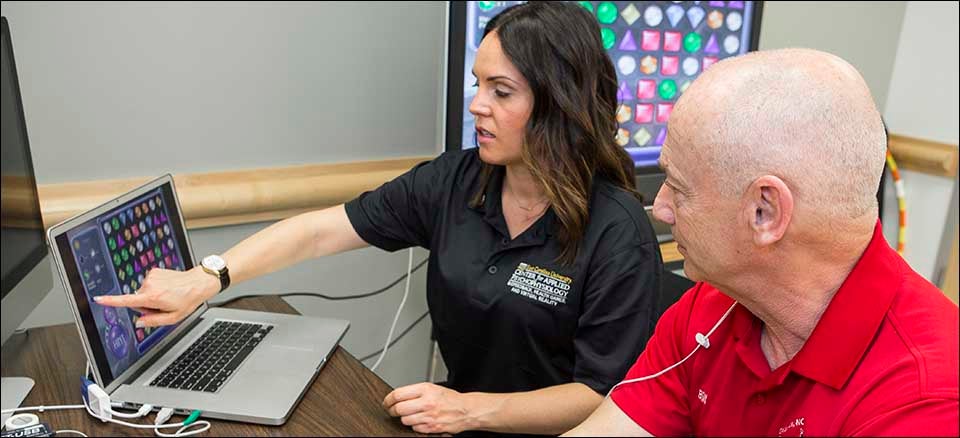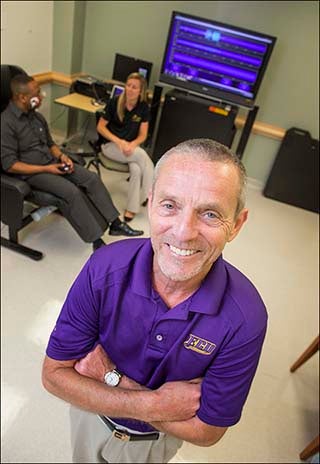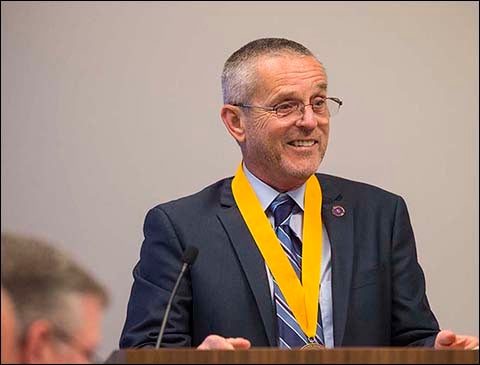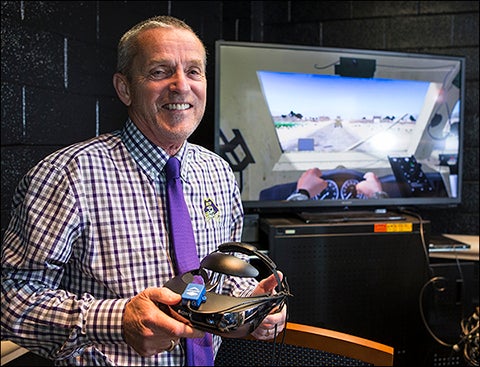A LIFE OF SERVICE
ECU professor receives Holshouser award for work with veterans, others
For a career dedicated to improving the lives of others, East Carolina University professor Dr. Carmen Russoniello has been presented the 2015 Governor James E. Holshouser, Jr. Award for Excellence in Public Service by the University of North Carolina system.
The prestigious award annually recognizes public service by faculty of the 17 UNC-system institutions. Underscoring its commitment to service, East Carolina is the only university to receive the honor three times since it was first awarded in 2007.
Pictured above, Russoniello stands at the lectern after he was presented the Holshouser Award at the UNC Board of Governors meeting Oct. 30 in Chapel Hill. Below, at the ECU Center for Applied Psychophysiology, Russoniello demonstrates the virtual reality equipment used to help wounded warriors. (Photos by Cliff Hollis)
“I’m awed by all that Governor Holshouser accomplished as a public servant and truly humbled to be recognized in his honor,” Russoniello said. He accepted the award to a standing ovation Oct. 30 during the monthly Board of Governors’ meeting in Chapel Hill.
Among the 160 in attendance were Russoniello’s wife, Ruth Ann; Dr. Glen Gilbert, dean of the College of Health and Human Performance; fellow ECU faculty members and Chancellor Steve Ballard.“One of the most important charges we have as an institution is service to our constituents. Dr. Russoniello embodies this spirit of service,” said Ballard. “His work to improve the lives of people from all walks of life makes us proud as a university and grateful as citizens of North Carolina.”
Russoniello’s contributions have spanned decades, beginning with his service as a Marine Corps machine gunner and decorated Vietnam combat veteran. He has since focused on the use of recreation therapy in the form of biofeedback and gaming as an alternative to medicine for people with stress-related medical disorders, including veterans and victims of Hurricane Floyd.
“At ECU, we do value service. I’m a clinician, and as a clinician, I’m always looking for ways to help people,” Russoniello said. He has more than 20 years of clinical experience as a therapist/counselor and works as scientific advisor to Biocom Technologies.
He spends most of his time as professor in the Department of Recreation and Leisure Studies in the College of Health and Human Performance and director of ECU’s Center for Applied Psychophysiology.
“What I learned through public service is what my mom tried to teach me,” Russoniello said. “That doing for others is expected and the rewards are the thoughts and feelings that maybe I’ve made as much of a difference in other people’s lives as they’ve made in mine.”
Addressing injuries of veterans
Severe anxiety, flashbacks, nightmares and uncontrollable thoughts are all symptoms of post-traumatic stress disorder, or PTSD.
The prevalence of PTSD among previously deployed Operation Enduring Freedom and Operation Iraqi Freedom service members is 13.8 percent, according to the U.S. Department of Veterans Affairs. Traumatic brain injuries are also common in veterans and are similarly incapacitating.
Russoniello knows this all too well. He developed PTSD after losing a mentor, friend and fellow machine gunner in his infantry platoon during the Vietnam War.
Years later, the experience would spark what he described as a “passion to determine the underlying physiological therapeutic benefits of recreation or fun activities.” Once he put his finger on that, he knew he would be able to use it to help people cope in significant ways.
Biofeedback technology turned out to be a big piece of the puzzle. “I became totally enamored by the efficacy of this non-pharmacological intervention and began to use it as my main intervention and measurement tool,” Russoniello said.

ECU doctoral student Dominiquie Clemmons-James, right, and then recreational therapy administration graduate student Tori Pinchuk demonstrate the biofeedback equipment used in the ECU Center for Applied Psychophysiology. (Photo by Jay Clark)
Biofeedback is the ability to view one’s nervous system on a screen – graphically and numerically – based on the signals sent by the human body when exposed to soothing or stressing sounds, images and other stimuli. “Biofeedback gives people the skills and they become empowered to improve their own health,” Russoniello said.
He opened a biofeedback lab at ECU in 2000 and has been providing free services to residents of eastern North Carolina ever since. Using biofeedback in combination with recreational gaming, Russoniello has proven significant advances in the treatment of PTSD and traumatic brain injuries.
In 2006, a program director from Camp Lejeune in Jacksonville asked him for help with treating Wounded Warrior Marines as they transition back into civilian life. Russoniello met some of the service men and women and saw himself in them.
“I realized that they, like me 40 years earlier, were in the middle of a very difficult transition that could determine whether they were successful or not,” he said.
It was a no-brainer. He described the request as what he “had been preparing for (his) whole life.”
Soon, a partnership formed between Russoniello’s biofeedback lab at ECU and the Wounded Warrior Battalion-East at Camp Lejeune. It has since improved the lives of hundreds of veterans who sacrificed greatly for the nation.
“That program saved my life,” said U.S. Navy Corpsman Dustin “Doc” Kirby. “It gave me the tools that I needed to help myself instead of just numbing the pain and pushing it away.” After four years of treatment in ECU’s biofeedback lab, Kirby was able to attend college and start a family.
Pictured below, Christina Brown-Bochicchio works with Bill Butler at the Center for Applied Psychophysiology demonstrating biofeedback using the Bejeweled computer game. (Photo by Cliff Hollis)

Sgt. Christopher Soldano is another of many success stories from what is now called the ECU Center for Applied Psychophysiology. He served three combat tours in Iraq as a U.S. Marine and came back severely altered.
He said his life was changed for the better after meeting Russoniello. “He was able to take his own experiences and knowledge and relate to me in a way that allowed me to accomplish things I never thought I would accomplish again,” Soldano said. “It is because of his skills that I am able to manage myself and my life even better than before my injuries.”
The center also offers a graduate certificate in biofeedback and trains students from numerous health care fields including nursing, psychology, counseling, medicine and recreational and occupational therapy.
“I actually think that’s the key to being successful in doing service – finding those areas where the community benefits, the students benefit and the university benefits,” Russoniello said. “It’s a win-win-win situation.”
Research for good
In September 1999, Hurricane Floyd devastated eastern North Carolina. Russoniello had just accepted an assistant professor position at ECU when he received a call from a social worker at an elementary school in Tarboro. Their school and many of their homes had been destroyed, and the fourth and fifth graders were distraught.
Pictured above, Russoniello stands at the lectern after he was presented the Holshouser Award at the UNC Board of Governors meeting Oct. 30 in Chapel Hill. Below, at the ECU Center for Applied Psychophysiology, Russoniello demonstrates the virtual reality equipment used to help wounded warriors. (Photos by Cliff Hollis)
“It was right about the time they were learning to trust their environment when it was just totally ripped away from them,” Russoniello said of the children.
The researcher in Russoniello saw an opportunity to make something positive of the devastation. He would counsel the students using coping activities such as games, and in the process, learn more about PTSD in children following natural disasters – a first-of-its-kind study.
They found that 73 percent of the children had moderate to severe symptoms of PTSD. He and his ECU students drove the 60-mile round trip twice a week for two years to see it through.
Their stress intervention techniques worked, resulting in a reduction of PTSD symptoms 11 percent faster during the time they delivered services than with no intervention. His study has since been cited in many top-level publications, government reports and epidemiological analyses.
He has also conducted research on the effective stress-reducing use of casual games such as Bejeweled, Peggle and Plants versus Zombies.
“What was then called Pop Games, now known as EA Sports, basically called me and said, ‘We’re making so much money and can’t figure out why,’” Russoniello said with a laugh. “They had tapped into something huge and didn’t know how they did it.”
His groundbreaking studies were featured in the New York Times, Washington Post, Time, BBC and CNN. His research had proven that biofeedback principles woven into casual video games made them therapeutic.
Russoniello has since created four smartphone apps for the U.S. Department of Defense using the phone’s camera as a sensor for biofeedback.
But he didn’t stop there. With another Department of Defense grant in 2012, Russoniello developed a revolutionary tool for service members during combat: a wireless ear clip which collects sophisticated stress data in remote locations so that professionals can analyze it instantly.
“The original idea was that a corpsman could use the system when a Marine went down to collect information and send it to an administrator in a HIPAA-compliant system,” Russoniello said.
They’ve since found more potential applications for it. “We may eventually be able to predict and even prevent conditions such as PTSD in Marines using data before, during and after deployment,” Russoniello said.
Modest beginnings
Russoniello’s personal story makes his contributions perhaps even more remarkable.
He was raised by a single mother in an impoverished area of Scranton, Pennsylvania. By his teenage years, he was living part-time on the streets and getting into trouble with the law. He dropped out of school by the 10th grade and joined the Marine Corps at 17, returning from his Vietnam deployment with no education, skills or direction.

Russoniello’s research uses biofeedback equipment, shown in background, to help wounded warriors recover from PTSD and traumatic brain injuries. (Photo by Jay Clark)
He was soon homeless, working odd jobs at an oil rig and picking fruit.
Encouragement from friends and counselors eventually led him to take a few classes at a community college.
“For me, education was a ticket to make something of myself,” he said. “I realized I could be successful at something that could help me build a career.”
He completed his bachelor’s and master’s degrees at Eastern Washington University in Spokane, Washington. While working as a recreational therapist in a local hospital, he earned his doctorate at Gonzaga University.
Russoniello said he hopes his early life experiences illustrate the importance of hard work and dedication.
“Because I came from ‘there’ and have experienced some success, I believe I add confidence to the notion that anyone can make it if they work hard and stay focused on being the best they can be,” he said.
The Governor James E. Holshouser, Jr. Award for Excellence in Public Service is named for the 68th governor of North Carolina. This is the first year that two winners were selected; Dr. Sylvia Flack, dean of the School of Health Sciences at Winston-Salem State University, shares the honor with Russoniello. The two winners will each receive a stipend of $7,500 and a bronze medallion.

Chris Soldano, right, works with ECU professor Matt Fish during a biofeedback session to treat post traumatic stress disorder. (Photo by Cliff Hollis)
UNC Board of Governors member Rodney Hood, who served as chairman of the selection committee, described Russoniello’s contributions as “unprecedented.” He said the Board of Governors received more nominations this year than in previous years, with about 80 percent of the UNC-system campuses nominating a faculty member.
ECU’s two previous Holshouser Award winners were Dr. Lessie Bass, social work, in 2008 and Dr. Thomas G. Irons, pediatrics, in 2011.
A UNC-TV video on Russionello’s achievements and honor will air on North Carolina Now at 7:30 p.m. on Wednesday, Nov. 4.



